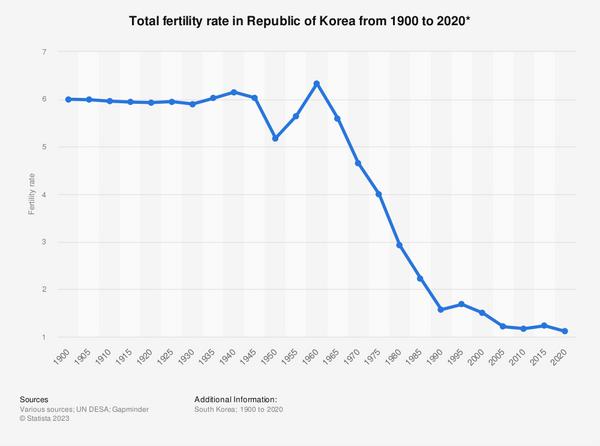
2 minute read
South Korea's birth rate & the government's response
Sieun Yeom (Claire)
South Korea recorded the lowest birth rate in the world since 2013, with the current rate being 0.78 (Ahn, 2023). The birth rate, which represents the proportion of births to the total population within a given time, is a critical concern for South Korea due to its ageing population. To address this issue, the South Korean government has implemented various policies to alleviate the problem and increase the birth rate.
Advertisement
The increasing cost of living and individuals prioritizing their careers over starting a family are significant contributors to the declining birth rate in South Korea Raising a child has become increasingly burdensome, particularly with inflation driving prices. Many individuals prioritize their job security and fear the potential consequences, such as losing their job, associated with starting a family
According to statistics released by the Korea Institute for Health and Social Affairs in 2019, a survey of 2,000 adult men and women aged 19-49 revealed that 44 7% of respondents cited financial instability as the primary reason for not having children.

Other reasons included the high cost of raising and educating children (19 3%), the convenience of living without children (12 6%), inadequate childcare facilities and services (7 8%), lack of a suitable environment for child-rearing (7.6%), excessive workload and busyness (6.5%), and personal choice (0.7%) (Jang, 2023)
To address these challenges, the South Korean government has implemented several policies. One such policy involves providing financial support to families Since 2022, mothers with newborn babies have received a cash payment of 2 million won ($1,510). Additionally, families receive a monthly allowance of 700,000 won ($528) for infants up to the age of one and 35,000 won ($264) per month for infants under two These allowances will increase to 1 million won and 500,000 won, respectively, in 2024.
Furthermore, additional monthly payments of 200,000 won ($151) for children until they reach elementary school age, as well as supplementary support for low-income families and single parents. Other benefits include coverage for medical expenses during pregnancy, infertility treatment, babysitting services, and even dating costs (Rashid, 2023) Also, the South Korean government has implemented policies to enhance worklife balance and support parents. The government has extended the duration of parental leave and encouraged companies to adopt flexible work arrangements, such as telecommuting and flexible working hours, to accommodate the needs of working parents (admin, 2023). Additionally, South Korea has expanded its early childhood education and childcare investment The government has increased the number of public daycare centres, improved the quality of childcare services, and expanded the availability of affordable preschool education. These efforts aim to alleviate the burden of childcare and make it easier for parents to balance work and family responsibilities

Despite the government's efforts to increase the birth rate in South Korea through these policies, it remains challenging to predict a significant rise in the birth rate in the near future. To address this issue effectively, it is crucial to tackle the underlying problem by changing people's perception that having a baby will put them at a disadvantage Besides financial incentives, the government can promote a more balanced work-life environment, offering flexible work arrangements, extended parental leave, and support for childcare services. Public awareness campaigns can also play a crucial role in challenging societal norms and fostering a more inclusive perception of family and parenting. Shifting societal attitudes and emphasizing the benefits and support available for families can help encourage a positive shift in the birth rate trend

Bibliography
Ahn, A (2023) South Korea has the world’s lowest fertility rate, a struggle with lessons for us all, NPR. Available at: http://www.npr.org/2023/03/19/1163341684/south-koreafertility-rate (Accessed: 16 May 2023) https://edu.chosun.com/site/data/html dir/2023/04/21/2023042102011.html#:~:text= (Accessed: 16 May 2023)
Rashid, R. (2023) South Korea has so few babies it is offering new parents $10,500, Business and Economy News | Al Jazeera. Available at: https://www.aljazeera.com/news/2023/4/12/south-korea-splashes-the-cash-in-scrambleto-fix-fertility-crisis (Accessed: 16 May 2023) admin PR News | Overcoming the PR Career Hurdles That Face Asian Women








